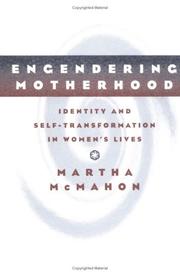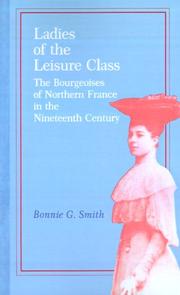| Listing 1 - 5 of 5 |
Sort by
|

ISBN: 1572300027 9781572300026 Year: 1995 Publisher: New York (N.Y.): Guilford press,
Abstract | Keywords | Export | Availability | Bookmark
 Loading...
Loading...Choose an application
- Reference Manager
- EndNote
- RefWorks (Direct export to RefWorks)
Sociology of the family. Sociology of sexuality --- Canada --- Motherhood --- Gender identity --- Middle class women --- Working class women --- Psychological aspects --- Attitudes --- -Middle class women --- -Motherhood --- -Working class women --- -Women --- Maternity --- Mothers --- Parenthood --- Women --- Sex identity (Gender identity) --- Sexual identity (Gender identity) --- Identity (Psychology) --- Sex (Psychology) --- Queer theory --- Attitudes. --- Psychological aspects. --- -Attitudes --- Motherhood - Canada - Psychological aspects --- Gender identity - Canada --- Middle class women - Canada - Attitudes --- Working class women - Canada - Attitudes --- Gender dysphoria
Book
ISBN: 0415084172 Year: 1992 Publisher: London Hutchinson
Abstract | Keywords | Export | Availability | Bookmark
 Loading...
Loading...Choose an application
- Reference Manager
- EndNote
- RefWorks (Direct export to RefWorks)
History of the United Kingdom and Ireland --- anno 1700-1799 --- anno 1800-1899 --- Middle class women --- Middle class --- History --- Case studies.

ISBN: 0691101213 0691053308 0691209480 Year: 1981 Publisher: Princeton (N.J.) : Princeton university press,
Abstract | Keywords | Export | Availability | Bookmark
 Loading...
Loading...Choose an application
- Reference Manager
- EndNote
- RefWorks (Direct export to RefWorks)
In a social and cultural study of nineteenth-century bourgeois women in northern France, Bonnie Smith shows how the advent of industrialization removed women from the productive activity of the middle class and confined them to a largely reproductive experience. Out of this, she suggests, they created their own world, centered on domesticity, family, and religion. To understand these women, the author argues, it is necessary to examine their world on its own terms as a coherent whole.Professor Smith draws on demographic, psychoanalytic, anthropological, linguistic, as well as historical insights and uses a variety of evidence that includes personal interviews, photographs, letters, genealogical records, and traditional archival sources. Part One outlines the transition from mercantile to industrial manufacturing that terminated the relationship between home and business and that separated the sexes according to their respective functions. Part Two concentrates on the lives of the women following their acceptance of an exclusively reproductive function and shows how the interdependence and fusion of household chores, religious values, and social conscience fostered a unified cultural system. Part Three, then, explores the propagation of this domesticity by the convent, as the primary educational system, and by the sentimental novel, as the vehicle most suited for an ideological expression of domestic life.
History of civilization --- anno 1800-1899 --- France: North --- Middle class women --- Middle class --- Femmes des classes moyennes --- Classes moyennes --- History --- Histoire --- -Middle class women --- -Women --- Bourgeoisie --- Commons (Social order) --- Middle classes --- Social classes --- -History --- -Social conditions --- -Middle class --- Women --- Social conditions
Book
ISBN: 0253289262 Year: 1984 Publisher: Sussex Wheatsheaf Books
Abstract | Keywords | Export | Availability | Bookmark
 Loading...
Loading...Choose an application
- Reference Manager
- EndNote
- RefWorks (Direct export to RefWorks)
Families --- Middle class women --- Mothers --- Sexual division of labor --- Working class women --- Division of labor by sex --- Division of labor --- Sex role --- Sex discrimination in employment --- Moms --- Parents --- Women --- Housewives --- Motherhood --- Pregnant women --- History --- Social change --- Sociology of the family. Sociology of sexuality --- History of the United Kingdom and Ireland --- anno 1800-1999 --- Great Britain
Book
ISBN: 1496206517 1496206495 9781496206497 9781496206510 9781496204219 1496204212 9781496205780 1496205782 9781496206503 1496206509 Year: 2018 Publisher: Lincoln University of Nebraska Press
Abstract | Keywords | Export | Availability | Bookmark
 Loading...
Loading...Choose an application
- Reference Manager
- EndNote
- RefWorks (Direct export to RefWorks)
"To understand how office workers shaped middle-class identities in Mexico, From Angel to Office Worker examines the material conditions of women's work and analyzes how women themselves reconfigured public debates over their employment"-- "In late nineteenth-century Mexico a woman's presence in the home was a marker of middle-class identity. However, as economic conditions declined during the Mexican Revolutionand jobs traditionally held by women disappeared, a growing number of women began to look for work outside the domestic sphere. As these "angels of the home" began to take office jobs, middle-class identity became more porous.
To understand how office workers shaped middle-class identities in Mexico, From Angel to Office Workerexamines the material conditions of women's work and analyzes how women themselves reconfigured public debates over their employment. At the heart of the women's movement was a labor movement led by secretaries and office workers whose demands included respect for seniority, equal pay for equal work, and resources to support working mothers, both married and unmarried. Office workers also developed a critique of gender inequality and sexual exploitation both within and outside the workplace. From Angel to Office Workeris a major contribution to modern Mexican history as historians begin to ask new questions about the relationships between labor, politics, and the cultural and public spheres."--
SOCIAL SCIENCE / Women's Studies. --- HISTORY / Latin America / Mexico. --- Middle class women --- Women clerks --- Women --- Human females --- Wimmin --- Woman --- Womon --- Womyn --- Females --- Human beings --- Femininity --- Clerks --- History --- Employment --- E-books --- History of Mexico --- anno 1800-1899 --- anno 1900-1909 --- anno 1910-1919 --- anno 1920-1929 --- anno 1930-1939 --- anno 1940-1949
| Listing 1 - 5 of 5 |
Sort by
|

 Search
Search Feedback
Feedback About UniCat
About UniCat  Help
Help News
News